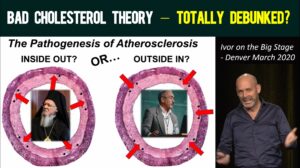Part 2 of a highly informative discussion with Arthur Agatston MD! You will know Dr. Agatston from his massively bestselling series of “South Beach” diet books – his new book featuring Keto, Kraft and CAC wizardly is available to pre-order here: Keto-Friendly South Beach
Here in part 2 he covers more case histories of special patients:
– isolated high Lp(a)
– classic familial hypercholesterolemia (FH)
– other genetic susceptibilities
We close with a discussion on how native LDL cholesterol is not at fault; rather the problem is that which causes poor little LDL particles to get caught up in the mess!
PART 1 IS AVAILABLE HERE: https://www.youtube.com/watch?v=oQmRBjhBqrs
FULL TRANSCRIPT BELOW:
Dr. Arthur Agatston 00:00:58 High Lp(a) which is here. So this is one of the primary genetic problems. And here’s a patient at 52. He came, he was like a friend of a friend of a friend, because his brother was skiing in Colorado. He was one or two years older than him, and he died suddenly. He was thin, healthy, but he didn’t know have a high Lp(a), you know, not treated. So he came to me, we did his calcium score. 52, 184, is awfully high. And again, this had been there for a while, but there were some small relatively young lesions; he was never treated for anything. And his Kraft Test was a little bit abnormal as well. Although his numbers you know, we’re not that bad. Lp(a) was 184.
Ivor Cummins 00:02:00 And I know the units vary, that could be milligram or could be nanomole.
Arthur 00:02:09 Normal would be up, in most up to 175. This is a very high number.
Ivor 00:02:13 Yeah, I think I’m 180 or something, which is in the top percenter too.
Arthur 00:02:19 Yeah. This is 99%. And positive family history. A very high calcium score for his age. He has, you know, some visceral fat. This is a little bit abnormal. He’s actually been doing well on low carb. With Lp(a), we have families, I’ve patients with high Lp(a)s, sometimes not this high. This high is more likely to have a high calcium score, but many patients with high Lp(a) with no plaque and no family history. So he has a family history and plaque.
00:03:01 We have one family from South America, from Buenos Aires where everybody’s had heart attacks in their 30s and 40s. And I’m seeing a fellow in his 40s and that’s where we also had a consultation with with Sam in UC San Diego.
Ivor 00:03:24 This guy as well, just for anyone watching, so his LDL is really low, really, I mean 60s down to 30s.
Arthur 00:03:31 We started to treat him… this was his baseline – 85.
Ivor 00:03:35 That’s a very low LDL for baseline, than 66 and then the 30s?
Arthur 00:03:39 Yes. His HDL was good.
Ivor 00:03:43 So all his lipids and his total cholesterol to HDL ratio is excellent around too even without statin?
Arthur 00:03:50 Right.
Ivor 00:03:50 So everything is good with this guy except Kraft Test is a fail with some visceral fat, but not too huge, and he has the high Lp(a). I often wonder Arthur, the high Lp(a) is genetically determined primarily so it does signify a certain genetic lineage if you have high Lp(a). I perceive it like FH that a high Lp(a) means you may very well be extremely susceptible to atherosclerosis in a modern environment. And I guess this guy has certainly has disease.
Arthur 00:04:24 Yeah. And so I’ve always been confused about high Lp(a), but now that there’s potential treatment, in fact, he is on the PCSK9 inhibitor because it lowers and it has lowered his Lp(a) considerably and we’re waiting to see that this new medication that may be available in years. So that really knocks the socks out of Lp(a).
Ivor 00:04:50 And that will be fascinating because if Lp(a) is an indicator of a genetic disposition, lowering it may not do so much or with this new drug that lowers that a lot – the first ever, it does a dramatic reduction in problems, then it will show the Lp(a) moiety itself to be causal.
Arthur 00:05:11 Yes! And of course we don’t know that but those studies are being done. And what I always ask when I first heard about this is, “Look, I have over the years, so many high Lp(a)s in people without coronary disease. I have some that do, but there are some families and this is one where, you know, he and his brother, I mean it’s not primarily lifestyle. His brother was particularly in great shape and without knowing anything, just dropped dead and he has a lot of plaque for his age without another reason. So we are treating him aggressively for his Lp(a).
Ivor 00:05:53 Well, given the high calcium score yet again, we see calcification as the arbiter. If he had no calcium, you wouldn’t be treating.
Arthur 00:06:01 No. Absolutely not.
Ivor 00:06:01 It’s interesting and for the viewer, every time it’s the calcification score that is the arbiter or decider of treatment.
Arthur 00:06:09 Absolutely.
Ivor 00:06:10 And the other stuff is all trying to find the root cause to give the best kind of treatment.
Arthur 00:06:14 Yes, yes. And the next I think is FH, Familial Hypercholesterolemia. Here we go.
00:06:24 This is a guy, he happened to be stopped by, not today, always in great shape. He retired recently – he’s 6’4”, was a basketball player, and he really put on his belly recently.
00:06:42 This is in 2001. Total cholesterol, 398. LDL, 332. HDL, low. Triglycerides a bit high. Now, he’s…
Ivor 00:06:56 Sorry Arthur, but that is not just FH, but his total cholesterol to HDL ratio is 10.
Arthur 00:07:03 Yeah.
Ivor 00:07:04 I mean, that’s FH.
Arthur 00:07:05 Yes.
Ivor 00:07:06 A plus ratios, it’s crazy about an enormous LDL.
Arthur 00:07:10 And he has but large particles. Okay? Large LDL particles. So, that alone.
00:07:18 Now today, since he’s had the belly, and he was actually just having his Kraft Test today, so we’ll know about that. Nobody in his family, I saw him I think at age 45, and none of the males have made it past the age of like 50 or 55. So we were treating him aggressively. So we gave him everything including the [00:07:45] and statins [00:07:48]. And we got his LDL variably 110, maybe 90, never to where we wanted it because he had a high calcium score. This was his score in 2015, early 2000. And so he always had a very high calcium score. And again, that was even though he had large particles, if he had zero calcium score, you don’t think we have to treat him, but he had a high calcium score and a positive family history. So we treated him as aggressively as we could.
00:08:30 It was about couple of years ago, when he was 62, he’s a little bit older now, I believe. He was in New York. I get a call from him. He’s having chest pain with exertion. He had never had anything like that. We got a cath up there, they opened the lesion. Now patients retreat aggressively for a long time. Our experiences, they don’t have heart attacks. But here, we definitely slowed his progression by the family history and everything else but we didn’t stop it. Because everything we never got his LDL near to our goal which would have been at least less than 70.
00:09:19 So this was just about the time when the PCSK9 inhibitors and Repatha became available. So we started him on that. His LDLs now are around 20, from a 110. So it’s about five years now and he continues to do very well, except since he retired he put on his belly. So this is an FH, where my presumption is while he had large particles, they weren’t being cleared that he was missing LDL receptors from the liver, and so they were becoming oxidized and were in issue.
00:10:02 The flip side is this woman, a very high LDL. She was 283, who refused statins. We saw her, I think she was 60. She came to me because everybody… here’s her LDL, you know?
Ivor 00:10:26 Yeah, around 200.
Arthur 00:10:29 Over 200. She was thin, her A1c, 5.8, but without a belly, but a zero calcium score without a family history. This was a different measure, but she had very large LDL, a good balance of small and large HDL. And so we followed her and after these 10 years her calcium score remains zero on no statin therapy.
Ivor 00:11:00 Right. Eeven for a woman in fairness, so long after menopause, a zero 70 years is quite rare.
Arthur 00:11:08 Yes.
Ivor 00:11:08 And yeah, this woman has carried a 200 plus LDL for decades.
Arthur 00:11:12 Exactly.
Ivor 00:11:13 Yeah. And there’s, actually there’s a lot more those beginning to come out now as the calcium gets used more and more and the internet is sharing. We’re getting a lot of reports back like this.
Arthur 00:11:22 Yes. And so this is a case where again, the calcium score was the arbiter. And I presume her large particles are being cleared, unlike the other guy with also with large particles that somehow aren’t being cleared.
Ivor 00:11:38 Or I guess, cleared versus non cleared or environment pro oxidative versus non pro oxidative. Though I know the other guy doesn’t have a particularly bad insulin and all, but I guess there’s these other things in the environment too, in their blood, and other immune conditions that might be hard to define.
Arthur 00:11:59 Whenever you… if the lipoprotein particle, large or small, remember, the small particles aren’t being cleared because they don’t fit in the receptors. In FH, we don’t know every with a high score, but the original reports from [Brader? 00:12:16] Goldstein with fewer receptors.
Ivor 00:12:20 It’s a longer resonance time and more damage.
Arthur 00:12:23 And more oxidation.
Ivor 00:12:25 It would be interesting to know though, are there people who can actually have a longer resonance time, but they had so little inflammatory or oxidative driver in their physiology in their blood that they can actually handle it? I guess it’s just another degree of freedom, but we can’t answer everything here. The point is, you can have super high cholesterol, super high Lp(a), with no calcium or disease in your 70s or you can equally, it can indicate a tendency towards rapid atherosclerosis and you get it in your 40s.
Arthur 00:12:57 Yes.
Ivor 00:12:57 So you need your level of digging in depth per patient to get to safety.
Arthur 00:13:03 Yes. And so the one who was susceptible, you know, we treat him aggressively, we didn’t stop progression, but we clearly slow it. In [00:13:12] we were able to get a new medication that with the statins has really gotten his LDL super low and clear. The way it works, it does increase receptors, improve receptors. So hopefully it’s working.
Ivor 00:13:33 Yeah. And the way I look at it is it’s not that native, undamaged LDL is in any way a problem but in someone like that, with long resonance time, serious genetic challenges going on, if you take away a lot of the particles, you’re removing one component of the atherosclerotic milieu and you’re slowing it down.
Arthur 00:13:53 Yeah. Well said.
Ivor 00:13:55 That’s the way I kind of view it, even though we do know there are a lot of people out there in the low carb community who question the LDL hypothesis sort of way, I question that as a native standard LDL is not in any way toxic. But modified LDL, other issues with long resonance time kind of make LDL be part of the progression, which is a very different thing than I think Arthur to be honest, there’s a huge unity of voices out there from orthodox sources trying to say that LDL is inherently toxic.
Arthur 00:14:30 No.
Ivor 00:14:30 This really is a challenge.
Arthur 00:14:35 No studies… you know, going back to, again, Bill Castelli in Framingham, the distribution of cholesterol and LDL in people from Framingham who have had heart attacks versus not, it was essentially the same, theyoverlap. There are other factors, certainly it’s accelerating, if you’re diabetic or prediabetic, but again, if you start with a fatty liver, the overstuffed VLDL, it’s not fitting into receptors, we know there’s a longer life in the circulation. And that gives the opportunity for oxidation. And so the extra large particles, the extra small particles don’t fit. But then you say, “Well, what about the normal sized particles in FH or in the people with really high HDL?” “Well, they have also a longer time in the circulation, but this time, it’s not because they are shaped abnormally, it’s because you have fewer receptors.
Ivor 00:15:44 So they’re always to make the native healthy particles become a problem.
Arthur 00:15:50 Yes.
Ivor 00:15:51 And they’re all compromised. I think that’s the way I like to look at it. The LDL can become part of the problem if it becomes compromised, in whatever mechanism as you say. And that’s a good unifying way to look at it, rather than blaming LDL per se, which rankles many people, including myself and yourself, it looks like.
Arthur 00:16:09 Yes.
Ivor 00:16:09 Excellent! So these are fascinating case histories. And I think are there any more of these?
Arthur 00:16:16 Not right now. Yeah, I have a 100 more to show, but I don’t think today.
Ivor 00:16:21 In terms of what we’re covering today.
Arthur 00:16:22 But all of these, we have, I mean, particularly with the Kraft Test, the ones that have been the biggest surprise, you know, this, we knew, we had examples, the big surprise for me over the past year has been the people with normal glucose tolerance but with abnormal Kraft Tests, that they have a fatty liver, they’re producing abnormal VLDLand LDL particles, it stay in the circulation and get oxidized and they cause coronary calcium. That I can show you case after case after just one year. And that happened. Ultimately, we know, because we do coronary calcium, otherwise these are young people we have no way of knowing.
00:17:21 I’ll show you one example of somebody already had a heart attack. He also had the genetic problem on top of the abnormal Kraft Test.
Ivor 00:17:30 Double trouble.
Arthur 00:17:30 Double trouble, and that’s probably why he had a problem so young. For the general population, what’s causing most of our chronic disease is high insulin secretion from insulin resistance even though your glucose tolerance is normal. So now we can identify those with a Kraft Test. And if one of the problems they have is heading for coronary disease, we can do that simply with the calcium score. Remember the calcium score, it predicts all cause mortality, not just heart attack. And why does it predict all cause mortality? That’s because the most common cause is pre or pre prediabetes, or diabetes, and that’s causing other causes of mortality, maybe even cancer, autoimmune and everything else.
00:18:35 We certainly know that when you bring sugar to Asia, to Africa,the third world, you bring all the chronic disease with it. When you bring it to the Eskimos, their cancer goes up, not just the heart disease.
Ivor 00:18:53 And the aboriginals and all of the people around the world.
Arthur 00:18:56 Oh yes! Absolutely.
Ivor 00:18:57 Yeah. And I think the only question now is what proportion of sugar and refined carbs is a huge power to us. And then the vegetable fats and the factory oils, of course, is probably a synergistic other, but either way the ultra processed food we’ve launched in the world, what is it made off? Only overwhelmingly refined carbs, sugar and vegetables are known holy triad of disease.
Arthur 00:19:22 And a good substitute for veg oils, and all I can say is I’m not volunteering for that experiment and I strongly suggest that my patients, anybody who listens, don’t volunteer. If somebody wants to do a long Greek clinical trial, fine. Until we get that definite evidence, let’s not bet our lives.
Ivor 00:19:47 On using light machine oil, lubricant for machines.
Arthur 00:19:51 Yeah, exactly.
Ivor 00:19:52 So, Arthur, yeah, we got to wrap it up now. I know but you know, it’s been fantastic to visit here. It’s been an honor to meet you. I was delighted that we’re trying to get the message out on behalf of Irish Heart Disease Awareness, ihda.ie, and that’s all about the calcium scan and awareness of the scan. But to find that the Kraft information also that you picked up on it and enjoyed so much learning by deploying it here in your practice, it’s a huge boon to myself and David.
Arthur 00:20:22 And I thank you, David, so much for that, because it’s largely from your podcasts and frankly, really convinced me about Kraft. I had some sense of insulin secretion, but none of this. So, thank you.
Ivor 00:20:39 Not at all. Great stuff Arthur. Lovely meeting you here. Thank you.
Arthur 00:20:42 Great meeting you. Okidoki.








